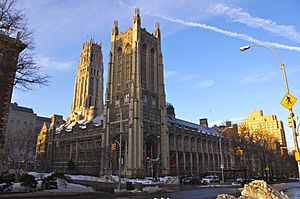Jacquelyn Grant facts for kids
Quick facts for kids
Rev. Dr.
Jacquelyn Grant
|
|
|---|---|
| Born | December 19, 1948 |
| Education | Bennett College (BA) Turner Theological Seminary (MDiv) Union Theological Seminary (MA and PhD) |
| Occupation | Author, professor, theologian, Methodist Minister |
| Scientific career | |
| Institutions | Interdenominational Theological Center, Atlanta |
Jacquelyn Grant (born 1948) is an American theologian and a Methodist minister. She is known as one of the four founders of womanist theology. This special way of thinking about faith looks at religion from the experiences of Black women. It includes their views and what they have learned about faith and good behavior. Dr. Grant is currently a professor of theology at the Interdenominational Theological Center in Atlanta.
Contents
About Jacquelyn Grant
Early Life and Education
Jacquelyn Grant was born on December 19, 1948, in Georgetown, South Carolina. She was one of nine children. Her father, Rev. Joseph J. Grant, was a pastor. Her mother, Lillie Mae Grant, was a cosmetologist.
From a young age, Jacquelyn was interested in religion. She went to Catholic school and finished Howard High School in 1966. She later studied at Bennett College and Turner Theological Seminary. She made history by becoming the first Black woman to earn a doctoral degree in systematic theology at Union Theological Seminary.
Her doctoral paper was about how different groups of women understand faith. At Union, she worked with Professor James H. Cone. He is known for starting black theology.
Ministry and Leadership
Jacquelyn Grant became a minister in the African Methodist Episcopal Church in 1974. She wrote important papers for the church in 1976 and 1980. These papers talked about the role of women in the AME Church.
She also started the church's Women in Ministry organization. This group later became the Commission on Women and Ministry. It helps women who serve in the church.
In 1977, Dr. Grant joined a research program at Harvard Divinity School. This led to the creation of the Women's Studies in Religion Program. She worked there for two years. She helped bring women together to discuss their roles and equality in the church.
In 1981, Dr. Grant started the Center for Black Women in Church and Society. This center is at the Interdenominational Theological Center in Atlanta. She is a professor there. The center has programs like the Womanist Scholars Program. It also helps Black women in church leadership.
Dr. Grant served as an assistant minister at two churches in Atlanta. These were Flipper Temple African Methodist Episcopal Church and Victory African Methodist Episcopal Church. She is now a respected professor at the Interdenominational Theological Union. She was married to Rev. Dr. John W.P. Collier, Jr.
Contributions and Recognition
Building Stronger Communities
Dr. Grant is known for helping to build stronger communities and churches. She guides many students, especially women of color. She was featured in Ebony magazine several times. She wrote about a religion school for men in prison. She also wrote about spiritual gifts.
Awards and Honors
In 1986, Dr. Grant received the Dr. Martin Luther King Jr. Ministry Award. She was also nominated as Woman of the Year in Religion. This nomination came from the Iota Phi Lambda sorority. She has been listed in Who's Who Among African Americans.
Dr. Grant has a research project that looks at how African-American people understand God. She studies this through black theology and black art.
She has worked with many groups around the world and in the U.S. These include the World Council of Churches and the National Council of Churches. She is also part of the American Academy of Religion.
Understanding Womanist Theology
A New Way of Thinking
Jacquelyn Grant's work helps us understand faith from a new angle. She explains that many Black women see Jesus as a close friend. This is different from how some churches see Jesus as far away in heaven. Dr. Grant shows how Black women use their faith to avoid unfair ideas about them.
She also points out that Black women are often the most active people in their churches. However, their hard work is sometimes not fully valued.
Challenging Old Ideas
Dr. Grant says that women who work for change in the black church can sometimes be put into certain boxes. She explains that calling Black women the "backbone" of the church might sound like a compliment. But she argues that it often means they are kept in the "background."
Dr. Grant, along with Katie Cannon and Delores Williams, helped start womanist theology. She felt that earlier black theologians, like James H. Cone, did not fully talk about the real lives of Black women. She noted that Black women were often "invisible" in both black theology and feminist theology.
Dr. Grant also believes that the challenges Black women face are different from those of Black men. She suggests that Black women need freedom and support even more than white women or Black men.
Defining Womanist Theology
Dr. Grant and James H. Cone both influenced another scholar, Delores S. Williams. Williams created a well-known definition of womanist theology. She said it is a strong voice that cares about the whole African American community. This includes men, women, and children.
Womanist theology helps Black women see and believe in their own experiences. It helps them understand how important their faith is for Christianity in the African American community. It fights against anything that stops Black women from surviving and living a good life. This theology stands against unfair treatment based on race, gender, social class, or other differences.
 | Sharif Bey |
 | Hale Woodruff |
 | Richmond Barthé |
 | Purvis Young |


